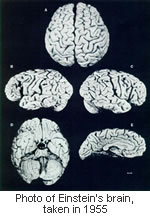 After his death in 1955, Einstein’s brain was removed – without permission from his family – by Thomas Stoltz Harvey , the Princeton Hospital pathologist who conducted the autopsy. Harvey took the brain home and kept it in a jar. He was later fired from his job for refusing to relinquish the organ.
After his death in 1955, Einstein’s brain was removed – without permission from his family – by Thomas Stoltz Harvey , the Princeton Hospital pathologist who conducted the autopsy. Harvey took the brain home and kept it in a jar. He was later fired from his job for refusing to relinquish the organ.The Saga of Einstein’s Brain: Pickled in a Jar for 43 Years and Driven Cross Country in a Trunk of a Buick!
Many years later, Harvey, who by then had gotten permission from Hans Albert to study Einstein’s brain, sent slices of Einstein’s brain to various scientists throughout the world. One of these scientists was Marian Diamond of UC Berkeley, who discovered that compared to a normal person, Einstein had significantly more glial cells in the region of the brain that is responsible for synthesizing information.In another study, Sandra Witelson of McMaster University found that Einstein’s brain lacked a particular “wrinkle” in the brain called the Sylvian fissure. Witelson speculated that this unusual anatomy allowed neurons in Einstein’s brain to communicate better with each other. Other studies had suggested that Einstein’s brain was denser, and that the inferior parietal lobe, which is often associated with mathematical ability, was larger than normal brains.
The saga of Einsteins brain can be quite strange at times: in the early 1990s, Harvey went with freelance writer Michael Paterniti on a cross-country trip to California to meet Einstein’s granddaughter. They drove off from New Jersey in Harvey’s Buick Skylark with Einstein’s brain sloshing inside a jar in the trunk! Paterniti later wrote his experience in the book Driving Mr. Albert: A Trip Across America with Einstein’s Brain
In 1998, the 85-year-old Harvey delivered Einstein’s brain to Dr. Elliot Krauss, the staff pathologist at Princeton University, the position Harvey once held:
"… after safeguarding the brain for decades like it was a holy relic – and, to many, it was – he simply, quietly, gave it away to the pathology department at the nearby University Medical Center at Princeton, the university and town where Einstein spent his last two decades.
“Eventually, you get tired of the responsibility of having it… I did about a year ago,” Harvey said, slowly. “I turned the whole thing over last year [in 1998].”
No comments:
Post a Comment